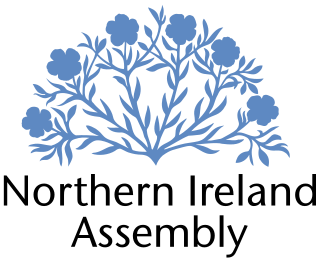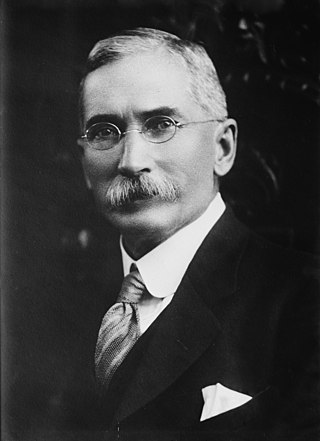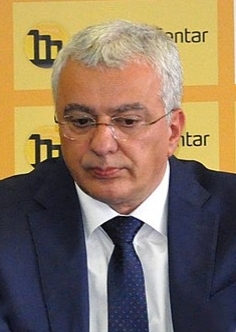The Republic of South Africa is a unitary parliamentary democratic republic. The President of South Africa serves both as head of state and as head of government. The President is elected by the National Assembly and must retain the confidence of the Assembly in order to remain in office. South Africans also elect provincial legislatures which govern each of the country's nine provinces.
A national unity government, government of national unity (GNU), or national union government is a broad coalition government consisting of all parties in the legislature, usually formed during a time of war or other national emergency. A unity government lacks opposition, or opposition parties are too small and negligible.

The president of South Africa is the head of state and head of government of the Republic of South Africa. The president directs the executive branch of the federal government and is the commander-in-chief of the South African National Defence Force. Between 1961 and 1994, the office of head of state was the state presidency.

The Northern Ireland Assembly, often referred to by the metonym Stormont, is the devolved legislature of Northern Ireland. It has power to legislate in a wide range of areas that are not explicitly reserved to the Parliament of the United Kingdom, and to appoint the Northern Ireland Executive. It sits at Parliament Buildings at Stormont in Belfast.

The Parliament of the Republic of South Africa is South Africa's legislature; under the present Constitution of South Africa, the bicameral Parliament comprises a National Assembly and a National Council of Provinces. The current twenty-seventh Parliament was first convened on 22 May 2019.
A dominant-party system, or one-party dominant system, is a political occurrence in which a single political party continuously dominates election results over running opposition groups or parties. Any ruling party staying in power for more than one consecutive term may be considered a dominant party. Some dominant parties were called the natural governing party, given their length of time in power.

The Leader of His Majesty's Most Loyal Opposition, more commonly referred to as the Leader of the Opposition, is the person who leads the Official Opposition in the United Kingdom. The position is seen as the shadow head of government of the United Kingdom and thus the shadow prime minister of the United Kingdom.
A grand coalition is an arrangement in a multi-party parliamentary system in which the two largest political parties of opposing political ideologies unite in a coalition government.
The Senate was the upper house of the Parliament of South Africa between 1910 and its abolition from 1 January 1981, and between 1994 and 1997.
The Unionist Party was a pre-apartheid South African political party, which contested elections to the Union of South Africa parliament from the 1910 South African general election until its merger into the South African Party just before the 1921 South African general election.

General elections were held in South Africa on 15 April 1953. The elections consolidated the position of the National Party under D. F. Malan, which won an absolute majority of the 156 elected seats in the House of Assembly, also receiving the most votes. Its first-time majority of the white electorate would be retained until the 1989 elections.

General elections were held in South Africa on 17 May 1933 to elect the 150 members of the House of Assembly. The National Party won half the seats in the House, but the coalition with the South African Party continued.

General elections were held in South Africa on 18 May 1938 to elect the 150 members of the House of Assembly. The United Party won an absolute majority.

The Tricameral Parliament, officially the Parliament of the Republic of South Africa, was the legislature of South Africa between 1984 and 1994, established by the South African Constitution of 1983, which gave a limited political voice to the country's Coloured and Indian population groups. The majority African population group was however still excluded, their interests notionally represented in the governments of the black homelands, or "bantustans", of which they were formally citizens. As these institutions were largely politically impotent, its principal effect was to further entrench the political power of the White section of the South African population.

The Western Cape Provincial Parliament (WCPP) is the legislature of the Western Cape province of South Africa. It is located at 7 Wale Street in Cape Town.

General elections were held in Kenya on 27 December 2002. Voters elected the President, and members of the National Assembly. They coincided with the 2002 Kenyan local elections.
Although the Democratic Alliance of South Africa in its present form is fairly new, its roots can be traced far back in South African political history, through a complex sequence of splits and mergers.

Sir William Thomas Smartt was a South African politician, and founder and leader of the Unionist Party.

The Leader of the Opposition of the Republic of Mauritius is the Member of Parliament who leads the Official Opposition in Mauritius. The Leader of the Opposition is the leader of the largest political party in the National Assembly that is not in government.

In Montenegro, the Opposition is all of the political parties represented in Parliament that are not a part of the Government supported by the parliamentary majority.


































